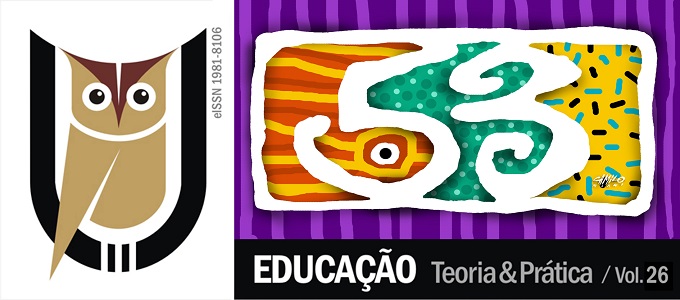WANDERINGS: RESEARCH AND FORMATION AS A SUBJECTIFYING PROCESSUALITY
DOI:
https://doi.org/10.18675/10.18675/1981-8106.vol26.n53.p595-611Keywords:
Formação, Experimentação, Corpo, SubjetividadeAbstract
This work seeks to explore the relationship between body, subjectivity, and formation of some aspects that involve the “making of research,” whose implementation took place between 2013 and 2015. The cartography (DELEUZE; GUATTARI, 2011; PASSOS et all, 2009; ROLNIK, 1989) elected by us as a method strived to accompany encounters with bodies, dance, contact improvisation, bio-dance, and lives in formation: “Dance and body expression.” This activity was integrated, in the second semester of 2013, the set of activities of the pedagogical axis “Interações Culturais e Humanísticas” at the Universidade Federal do Paraná, Setor Litoral. There were some contributions to the field of education through the intensities mobilized during the research’s production. The process of formation of a researcher presenting smaller elements, minor elements, not teaching itself, the representation or the discovery of the world, but research, movement, doubt, and the invention of worlds, mediation of desire. In this sense, the text that we present proposes a) point out some encounters that resonated with the body of the researcher and b) explore the effects that, in intensity, mobilized and continue to mobilize a process of formation. Keywords: Formation. Experimentation. Body. Subjectivity.Additional Files
Published
How to Cite
Issue
Section
License
Authors who publish in this journal agree to the following terms:
a) Authors assign copyright to the journal, with the work simultaneously licensed under the Creative Commons Attribution License that allows sharing of the work with acknowledgment of authorship and publication in this journal.
b) The policy adopted by the Editorial Committee is to assign copyright only after a period of 30 months from the date of publication of the article. After this time, authors interested in publishing the same text in another work must send a letter to the Editorial Committee requesting the release of the assignment of copyright and wait for a response.
c) This journal provides public access to all its content, since this allows greater visibility and reach of published articles and reviews. For more information on this approach, visit the Public Knowledge Project, a project that developed this system to improve the academic and public quality of research, by distributing OJS as well as other software to support the public access publication system to academic sources. The names and email addresses on this website will be used exclusively for the purposes of the journal and will not be available for other purposes. This journal provides open any other party  This work is licensed under a Creative Commons License
This work is licensed under a Creative Commons License











